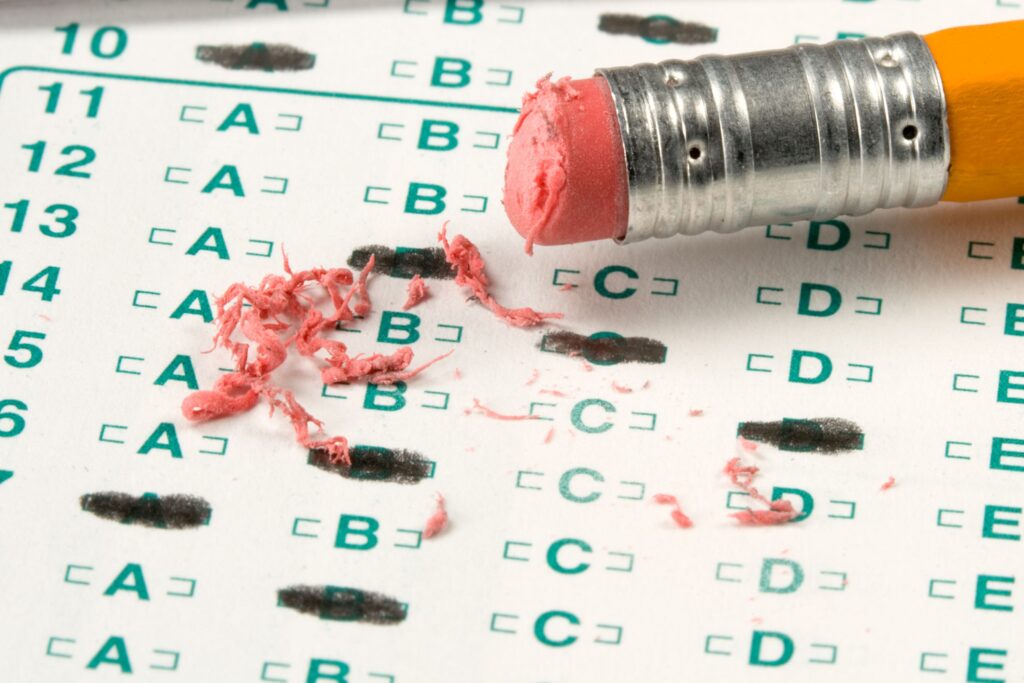Administering standardized assessments is one of the most significant causes of frustration among American educators. There are a myriad of continuous discussions surrounding students taking standardized assessments and the results being used to gauge the quality of students and schools. These discussions, along with personal experiences, are what fuel educators from around the country to weigh in on the necessity or lack thereof for standardized testing.
Pros and Cons of Standardized Testing
I believe that the impact of standardized testing on education is so poignant that educators have based their decision to stay or leave the field based on the way it is handled in individual states. Therefore, exploring the pros and cons of such tests is a must if we wish to positively impact our students by retaining and recruiting those educators who have the greatest influence over our learners.
Pros
Having a standard measuring stick of what it looks like to be college and career ready is one of the pros as it pertains to standardized testing. Ensuring that every graduate in America is equipped to become a productive member of society is crucial in terms of moving our nation forward. Knowing this, it is a must that our definition of college and career readiness be identical across state lines. It weakens us when only a portion of our country is adequately prepared for the workforce. Standardized assessments provide us with a mirror image of the preparedness of each generation to meet the workforce demands.
Data from standardized testing can be a powerful tool while working to close achievement gaps among learners. The fact that the data extracted from such assessments allows educators to compare student performance across schools, districts, and states grants teachers with the necessary information to determine if students are on par with their peers nationally. In addition, oftentimes, the assessment data provides an indicator that displays specific areas of students’ strengths and weaknesses, which assists teachers to hone in on areas that are causing students to struggle.
In addressing these areas, students are better equipped to work towards performing at the same level as their peers, in turn, closing the achievement gap. Having the academic gaps among students decrease helps to boost the diversification numbers in terms of the groups of students who are graduating prepared to assimilate into life beyond our K-12 classrooms.
Cons
The other side of the coin with standardized testing is not as positive as the previously discussed benefits. For instance, standardized testing has long been used to compare school, district, and state performance. Frequently, the comparison leads to labels such as failing school or school of excellence. The identifying of schools that are doing well or are in need of assistance is not the issue. It is the stigma that has been attached to such labels. Stigmas such as teachers assigned to failing schools are not as effective or teachers assigned to a school of excellence are some of the best in the field. The presentation of the data can sometimes be misconstrued in such a manner that educators walk away feeling defeated as opposed to empowered and equipped to move the needle.
Another issue that is often associated with standardized testing is the assessments paint an inaccurate picture of students who could be better test takers. I have encountered a number of students who excel academically but struggle with standardized testing. Their less-than-stellar performance on the tests ultimately causes them to be excluded from opportunities such as placement in gifted and talented programs and competitive academic scholarships. Utilizing standard test data in silo does little for the betterment of students. In fact, based on the aforementioned uses of standardized placement, we prevent some of our brightest students from having access to challenging courses and financial resources that could potentially improve their lives.
Redefining Assessment in Education
While standardized testing has done some good in the way of providing information, they have also assisted in the decline of interest in people entering in the profession and the lack of diversification in advance placement courses among students. Therefore, we must redefine what we deem as an effective assessment. As a practicing practitioner, I have found the following types of assessments to be most beneficial.
Formative Assessments
Formative assessments are checks for understanding tests that occur during instruction. They allow for immediate corrections to be made to teaching and learning based on the needs of the students. This helps to prevent large number of learners from being unsuccessful on end of unit assessments. In addition, students who suffer with test anxiety are less likely to panic because formative assessments are shorter and can be less formal in terms of where and how they are administered. Educators utilize formats such as ticket out the door, thumbs up, thumbs down, oral responses, or short quizzes as formative assessments.
The data collected from these tests tend to lead to more in the moment discussions among educators about what is working and what may need adjusting in order to ensure student success. These discussions allow for opportunities to share strategies that have been proven effective for students to master the content. Formative assessments also allow for more immediate feedback to be given to the learners. Immediate feedback has been determined by education experts such as John Hattie to have an extremely positive impact on students’ academic achievement. The greater the impact on achievement the greater the likelihood that the students will become positive contributing members of society.
Project-Based Assessments
Every student does not learn the same is a statement that most educators become familiar with during their first education course. However, we continue to assess all students the same. Project-based assessments allow us to tap into our students’ various learning styles. Affording our students who are not necessarily the best at paper and pencil assessments an opportunity to show what they have learned through other avenues is a win for both students and educators.
It allows the student to experience success and access appropriate course placement and competitive scholarships. The educators are provided a more accurate picture of what the student has or has not mastered. In terms of the type of assessment, project-based tests can be summative like standardized tests. However, they are more hands-on and are less limited in terms of setting.
Educators never stop learning; check out our available graduate degree programs to hone your skills and promote lifelong learning and academic excellence.




